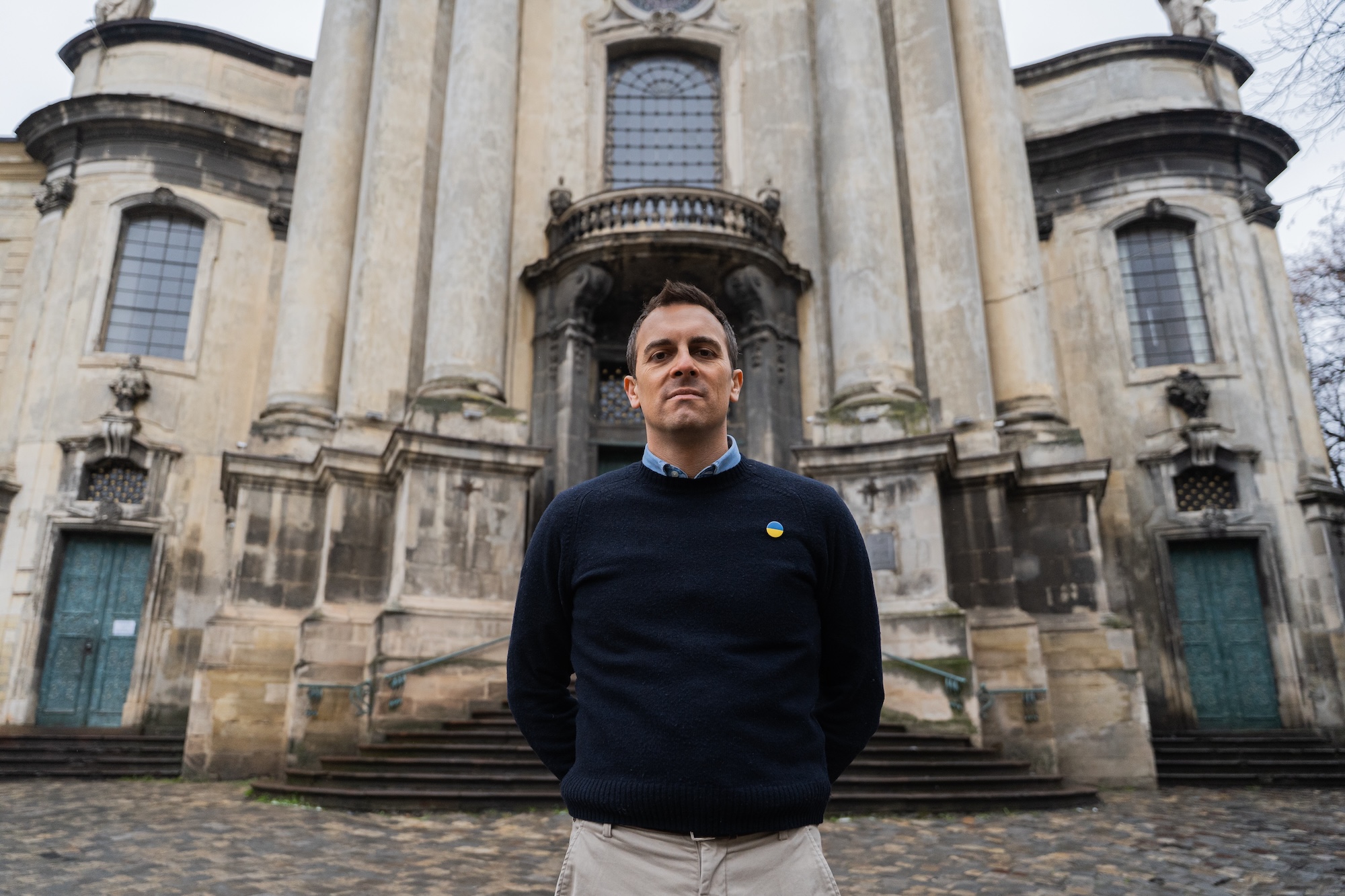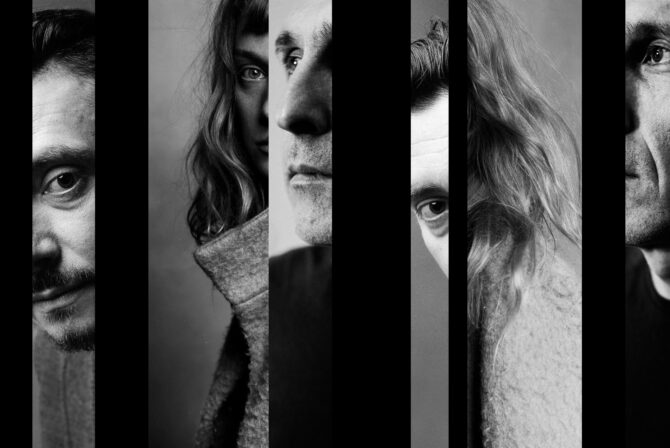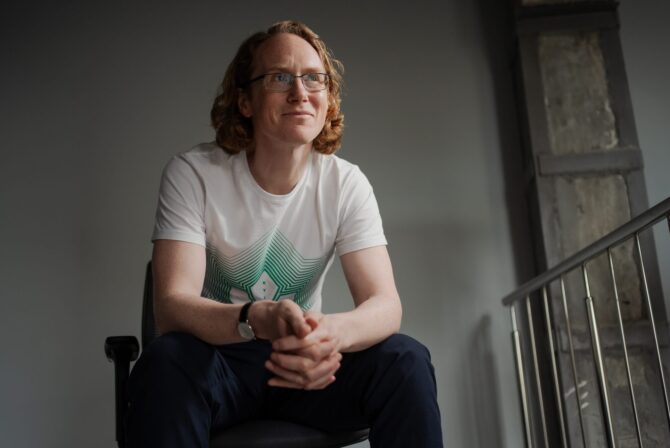Francesco Chiamulera, an Italian journalist and director of the Una Montagna di Libri literary festival, didn’t have any connections with Ukraine before 2022. On February 24, he cried over its fate and the fate of Europe. First, he went to Kraków to help Ukrainian refugees, and then found the courage to travel the route from Lviv to Kyiv, Bucha, Borodyanka and Yahidne. By travelling across Ukraine, he discovered many aspects of Ukrainian history, culture and literature, and since then, his fascination has only grown. Currently, he’s working on building a partnership between his hometown of Cortina in the Alps and Lviv, inviting the Ukrainian literary vanguards to a festival attended by the entire Italian elite. He also organises events dedicated to Victoria Amelina. Jointly with the Cultural Strategy Institute in Lviv, he’s working on creating a rehabilitation programme for Ukrainian veterans in the Dolomites.
He was led to Ukraine by his faith in Europe and democracy, as well as the realisation that when we were fighting for our freedom in 2013, he was sitting on his couch in Italy, seeing Europe as something he could take for granted. Francesco can undoubtedly be considered an advocate of Ukraine in Italy. Even though the Italian society is very susceptible to Russian propaganda, he believes that heartfelt stories are capable of effecting real change. This is why he writes for Il Foglio, Corriere della Sera and Linkiesta. We spoke to Francesco Chiamulera about the Italian media landscape, challenges facing democracy and Europe and Italian-Ukrainian relations.
§§§
More than a hundred years ago, your city of Cortina and my city of Lviv belonged to the same state — the Austro-Hungarian Empire. Soldiers from Cortina even fought in Galicia. How do you think we can use this common history to rethink the past and build a common future?
In my opinion, if there was one empire among all the empires that was the least evil, it was the Habsburg Empire. It was unsuccessful and imperfect, but despite its many shortcomings, it served as a laboratory for the coexistence of languages and cultures.
Cortina and Lviv, which are dramatically different cities, ended up in the same region by pure coincidence. However, when I first came to Lviv and had a meeting with Andriy Sadovyi at the city hall, I saw that I was surrounded by masonry stoves — the same ones we use in Cortina to heat our buildings. It fascinated me. Also, the kerosene lamp was invented in Lviv, and a few decades later, it was used on a massive scale in the Alps.
But there is more: education played a major role in this Austrian cultural sphere. In the late 19th and early 20th centuries, education in different languages was widely available in Cortina. Schools could teach Italian and, for example, some other local dialect of the Neo-Latin languages. This empire was tolerant of the idea that there are different languages and that they should be respected. We can build on this inspiration of a multilingual, multicultural, and cross-border world and do something productive.
I’ll quote the Colombian writer Héctor Abad, who said that Gandhi lay down on a railway track to protest against the British because he knew that the British Empire would stop that train.
My great-uncle in Trieste could protest against the Habsburgs because he knew that in the end, they would hesitate before killing him or putting him in prison for life.
He protested by throwing doughnuts and krapfen at the emperor’s portrait. He was put behind bars, but his family managed to secure a pardon and get him released.
Today, Putin, like Hitler or any other dictator in the 20th century, would not stop this train. And it’s not just about the courage and bravery of those who fight for freedom, but also about how strong and cruel the evil nature of this empire is.
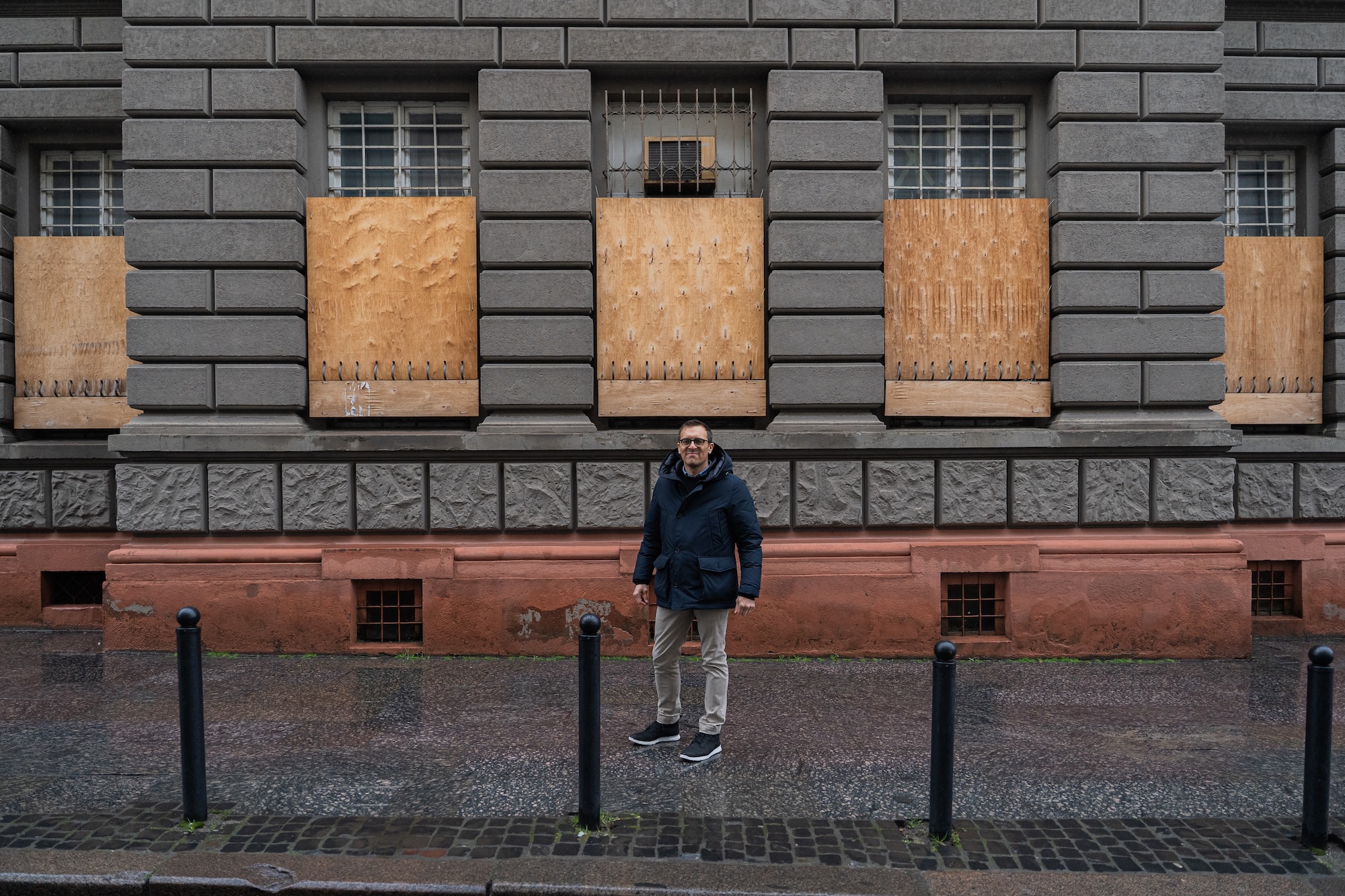
Tell us, how did you become interested in Ukraine?
What experience did you have before 2022? As you know, we had a revolution in 2013, and then Russia occupied Crimea and parts of Donetsk and Luhansk oblasts. How were these events presented in the Italian media? Did the Italians understand that it was indeed a war and Russia’s armed aggression?
The Italian media portrayed Euromaidan as a rebellion in the name of Europe. They showed images of brave people protesting in Kyiv. I also remember naïve claims coming from the Obama administration and European leaders in 2014 that this could be fixed somehow and would not lead to Russia’s complete annexation of Crimea.
To be honest, I already hated Putin a decade ago. And not just Putin, but above all, Russian chauvinism and extreme imperialism. But at the same time, I have to admit that we Italians, and I in particular, should have woken up much earlier.
After the outbreak of full-scale war, you went to Kraków to help Ukrainian refugees. Why did you decide to do this, and how did this experience change you?
In 2022, I discovered that I had no connection with Ukraine at all. I found myself thinking: what am I going to do now? I was quite scared to go to Ukraine at the time — Russian troops were in Bucha and near Kyiv. I thought I could get as close to the border as possible and show that Europe stands in solidarity with Ukrainians.
I thought that there could never be too much humanitarian aid. And I have always, always supported the provision of as much military assistance as was needed. And I believe that the Biden administration and the European Union have not done enough.
I used to go to Kraków to volunteer at NGOs. At first, I went alone, and then I convinced some of my friends to join me. I remember this wave of people who came to help from all over Europe, even from Portugal. People were travelling at night, bringing clothes or money to buy whatever Ukrainians needed.
This was how I became closer to Ukraine, and then I began to meet and have contacts with its people.
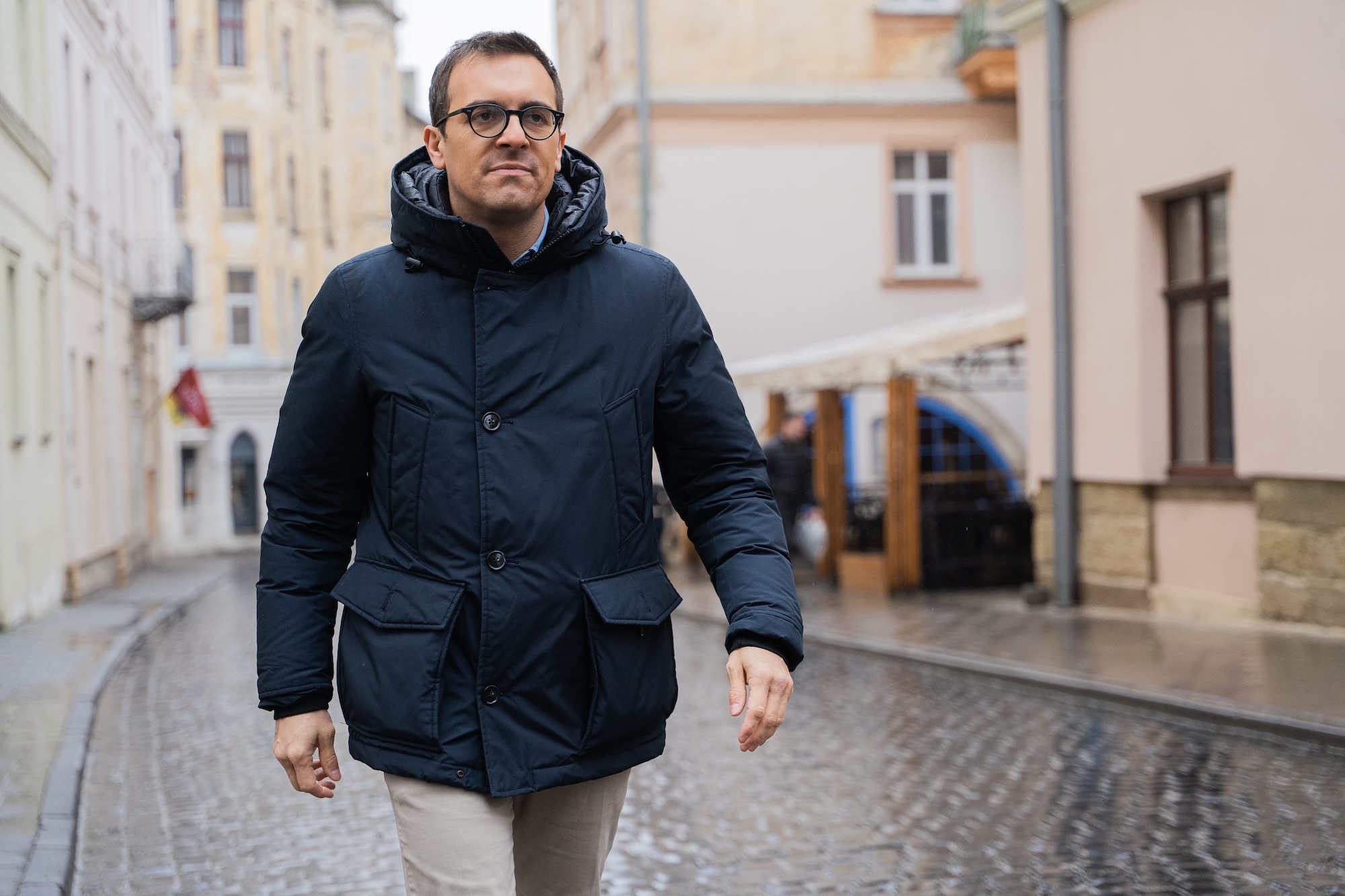
Italian Prime Minister Giorgia Meloni has clearly condemned Russia’s aggression and supports Ukraine’s territorial integrity. As a member of the G7, Italy is in favour of providing Ukraine with a $50 billion loan taken from frozen Russian assets. However, due to the US tariff policy, her position has become more cautious. How do you assess Italy’s policy towards Ukraine?
Giorgia Meloni and her government are facing a difficult legacy in public opinion. There are many historical reasons for these behavioural patterns, including the presence of the largest communist party in the Western world for many decades, and a heavy dependence on Russian energy until two or three years ago.
There is also a general distrust of media and institutions among Italians, which in turn opens an easy way in for Russian propaganda. In addition, we have a very small middle class, which used to be the most well-read segment of the population in the Western world.
Mario Draghi’s government tried to do a lot for Ukraine, and during the short period he was in power, Draghi travelled to Kyiv by train with Olaf Scholz and Macron — on his own initiative.
Giorgia Meloni is currently following the initiative led by Draghi and is in close contact with our President Sergio Mattarella, who is undoubtedly a strong supporter, a reliable and consistent backer not only of the European and Ukrainian cause, but also of Ukraine’s right to full self-defence and the need for Italy’s assistance.
I will say that Meloni has so far shown herself to be a staunch supporter of Ukraine, but we all have many concerns that the many ‘elements’ in her coalition who either do not care about the issue at all or are at times even openly sympathetic to Russia could lead her government — and herself — down the wrong path. As she seeks to maintain a close relationship with Donald Trump, this could well become a problem in the future.
You work with many Italian media outlets and are well-versed in the Italian media landscape. How strong is Russian propaganda in Italy? What can we do to counter this propaganda?
Russian propaganda is colossally strong, and usually its main vehicle is the word ‘peace’. It would be more accurate to call it “mir” [says the word “peace” in Russian — Ed.]. This is exactly the same policy that the communists pursued before the fall of the Iron Curtain. I think you know what stands behind the word “mir.”
The problem is that Italy, like Germany, was one of the countries that pursued an aggressive war, lost it, and then was forced to give up not only the ability to attack other countries through war, but also the very idea of war.
This is incredibly naïve.
War sometimes comes to you, and you have no choice whether to accept it or not. Italians are of the opinion that they can choose not to participate in the war.
So this is not only due to Russian propaganda, but also a futile idea from the past, that if I don’t look at the problem, the problem will let you live in a state of ‘peace’. But this would not be a peace like the one achieved after the Second World War, when the allies — the Americans, the British and the French — took responsibility for preparing the conditions for peace to be established at least in the western part of Europe. It was an organised peace.
What can we do about the Italian media? The problems are enormous. We could put even more energy into it, but even that wouldn’t be enough.
I think a significant “investment” would be a great novel about Ukrainian history, which could improve knowledge among people who may not have received such information through essays or newspapers, which are fading into the background in the Western world.
And how difficult is it for you as a journalist to tell the truth about Ukraine to the Italian audience?
I believe that heartfelt stories are always interesting to readers.
The media I write for are guaranteed not to have any fondness for Russia. They support the Ukrainian cause. For example, the main Italian newspaper Corriere della Serra accurately reports real events from Ukraine. They have a correspondent, Lorenzo Cremonesi, a brave journalist who stayed on the frontline to tell the stories of Ukrainians without any prejudice. And as long as there are journalists like that, I am quite optimistic.
Also, there is a very good journalist at RAI Television, Stefania Battistini, who went to the Kursk region during the offensive.
I have just mentioned two of the few Italian journalists who helped change the narrative. There are also individual voices that sometimes work more effectively than newspapers through their social media presence.
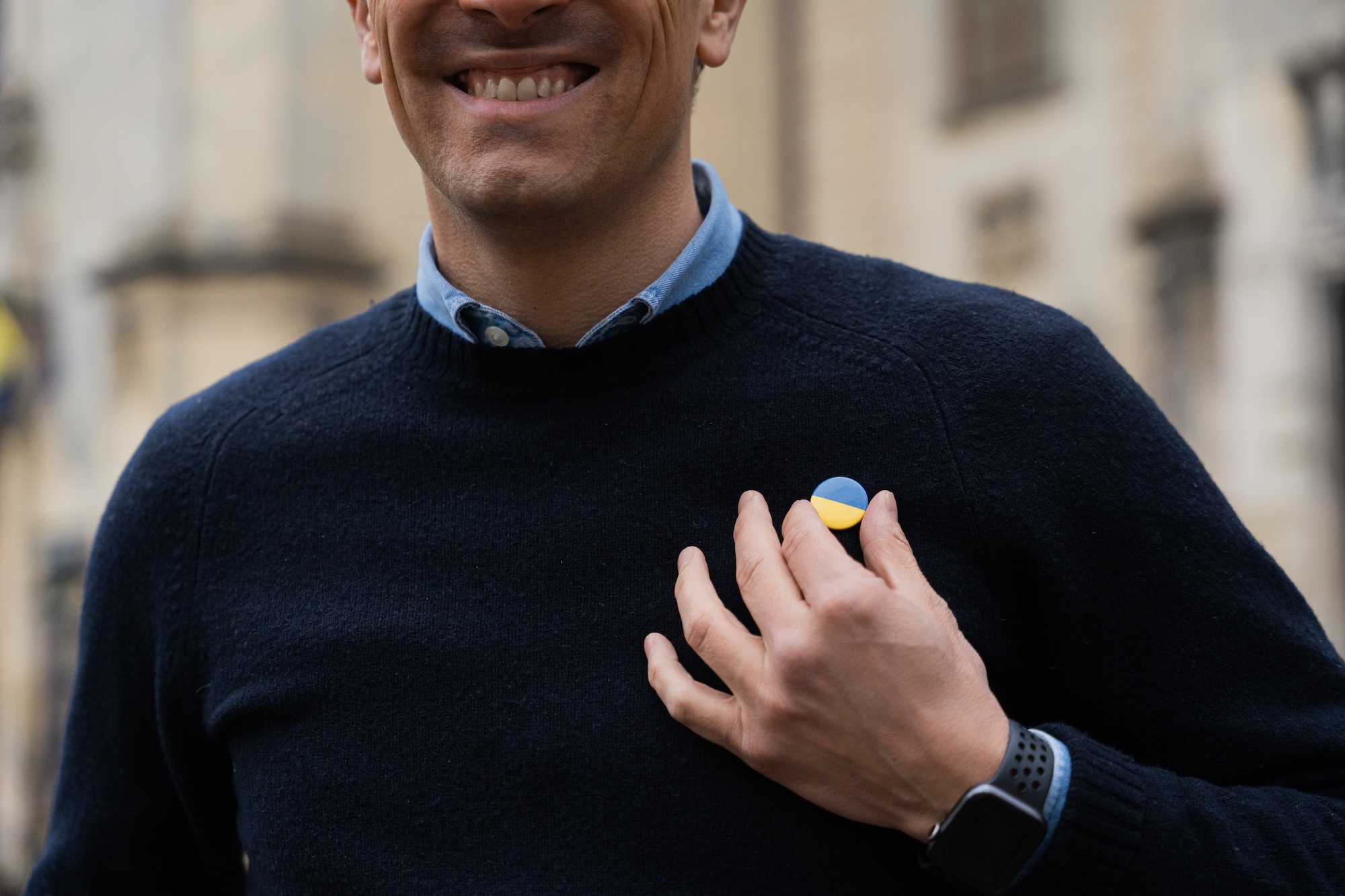
You have consistently defended democracy and visited countries that are fighting for it, such as Taiwan. Why are these countries important to you?
Purely because I feel that the front line is there. Italians with evil or stupid intentions don’t understand that when they say, “If you are so keen to protect Ukrainians, why don’t you go to the front yourself?”
Very selfishly, I could answer that I support the Ukrainians and Taiwanese because they are going to the front instead of me. They are doing me an incredible favour by allowing me not to be faced with a choice of whether to go to war or not. So I’m doing it because it’s the least I can do. Of course, I am not as brave as most Ukrainians on the front line.
I clearly remember my grandfather, who lived in Milan, saying in the 1960s that we are only strongly anti-communist and anti-totalitarian until the communists come to power in Italy. Fortunately, this did not happen.
He said, “As long as we are free, let us at least be aware of where that freedom comes from.”
Why is this concept of Europe and European democracy so important to you?
Do we have an alternative?
The European Union was born with the North Atlantic Treaty. It is the natural outcome of an alliance between the democracies of the free world.
Of course, we are now witnessing many elements of this idea being obscured or fading. How much can we count on the Americans? How much can we rely on the very link between free markets and democracy?
But when you visit the countries of Eastern Europe that were once part of the Warsaw Pact and then joined the European Union, you see tangible results. Several years of being part of a community of nations also helped to weaken some elements of possible nationalism that might have been born after the collapse of the Soviet Union.
The greatest results of the European Union’s development are felt in Poland, the Baltic States and the rest of Europe, including Hungary. Although the current Hungarian government is, of course, trying to change that course.
However, the most important thing is this: once, in Ukraine, I was in an apartment and saw the EU flag hanging next to the piano. There was a photo of a young woman on the Maidan, defending Ukraine’s right to join the European Union. At that same time in 2013, I was sitting on the sofa in my house, taking the European Union for granted.
You studied and lived in Boston for a while, so America is close to your heart. How do you perceive the current changes in US foreign policy?
I graduated with a degree in American history. My final thesis was about Ronald Reagan.
I consider what is happening now in America to be one of the greatest ideological tragedies in my lifetime.
For many years, I tried to convince Italian citizens who professed pure anti-Americanism because of the presence of American military bases on our territory, particularly in northeastern Italy, that these bases were created to preserve peace and that they were a force for good. And now I find myself admitting that something has gone terribly wrong with America.
This process is charismatically driven, irrational, based on ideas of hegemony. I would call it a totalitarian tendency in US politics never before seen in our lifetime. And, as my friend, the editor-in-chief of Linkiesta, Christian Rocca, says, we are witnessing the emergence of the first anti-American president in the history of the United States.
At the same time, the American society and democracy have strong antibodies. We must realise that nothing in the modern world can be taken for granted.
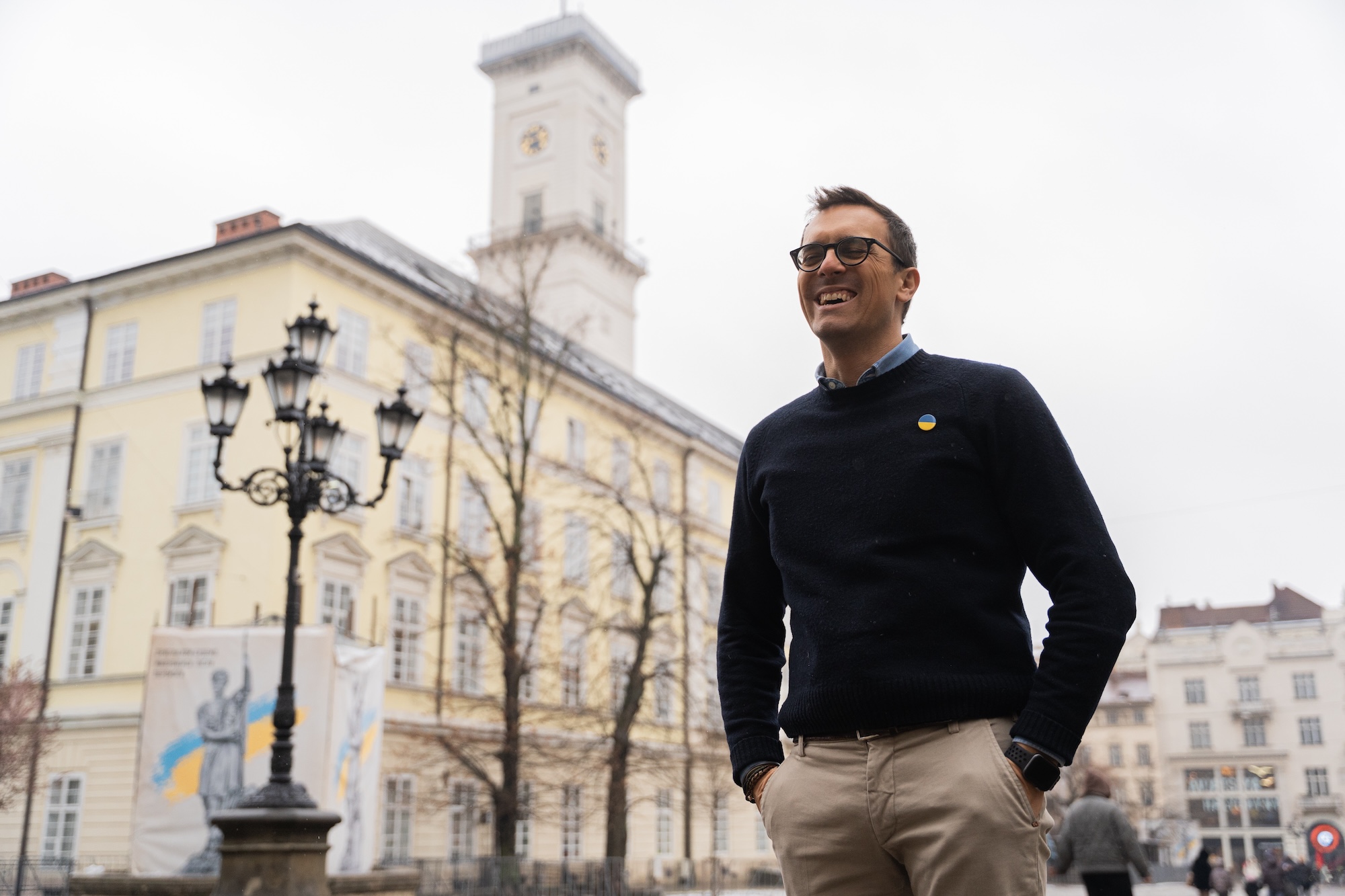
After the shocking changes Trump implemented in US relations with Europe, there is a serious threat that America will no longer support it. Have the Italians realised that they are not safe and need to mobilise more to be able to protect themselves?
I will be honest — I don’t think that the Italians have realised this yet. I think they will wake up soon.
They are betting on the fact that America is still providing protection. Italy has always been considered too big to fail. So, in a geopolitical sense, the Western world could not afford to lose Italy. However, very soon Italy will have to determine how much money it will allocate to defence as a percentage of GDP and how it will actually contribute to the NATO and EU budgets.
The forces of resistance to this in Italy are currently winning, they are holding rallies under the banners of peace, not realising that once this problem becomes very urgent, raising some flags will not be enough.
Sixteen years ago, you founded a literary festival that brings in an extraordinary audience. What place is there for Ukrainian authors at this festival? How difficult is it for you to attract the attention of the Italian public to make sure the Ukrainian authors are heard?
It has never been difficult. We have a huge audience, and there is a lot of not only enthusiasm but also curiosity. People want to know, they want to learn, they want to be better informed.
Since 2022, I have been inviting Ukrainians to Una Montagna di Libri, or other speakers who have a reasonable view on the situation. From Ukraine, I have invited Yaryna Hruscha, you, Olesya Yaremchuk, Yaroslav Hrytsak, and others. From other countries — Anne Applebaum, Radosław Sikorski, Cecilia Sala, Lorenzo Cremonesi, Nona Mikhelidze.
The audience’s reaction was always enthusiastic. There was never a protest. No one felt that their idea of the truth had been violated. When we inform people in an honest way, it works.
How would you describe the importance of this festival for Italy?
My friends and I founded the festival 16 years ago. I would say that it is based on Cortina’s long tradition of welcoming authors from Italy and from all over the world: to talk about their books, to meet readers, and sometimes just to spend time in some of the most beautiful landscapes in the world, the Dolomites, to get inspired or just to have a bit of rest in order to continue their work.
But I also won’t leave out the everyday and social aspect of people coming together around books. This is something that Italians have loved to do in the past. We thrive on this Cortina tradition, and we can build on it.
You came to Ukraine to establish a partnership between our countries. In your view, on what levels can such cooperation take place?
The first thing to do is to continue promoting and inviting Ukrainian voices to Italy and to receive high-quality information from Ukrainians about new developments in Ukrainian culture.
I’m looking forward to this Ukrainian social vanguard, because it’s quite obvious to me from the outside that a group of patriots in 2013-2014 decided to take the lead in Ukraine, not by excluding the rest of society, but somehow pulling people towards new ideas and new frontiers. So over these last ten years, they have not only demonstrated incredible courage and strength, for which we will always be grateful, but also provided a fertile ground for ideas.
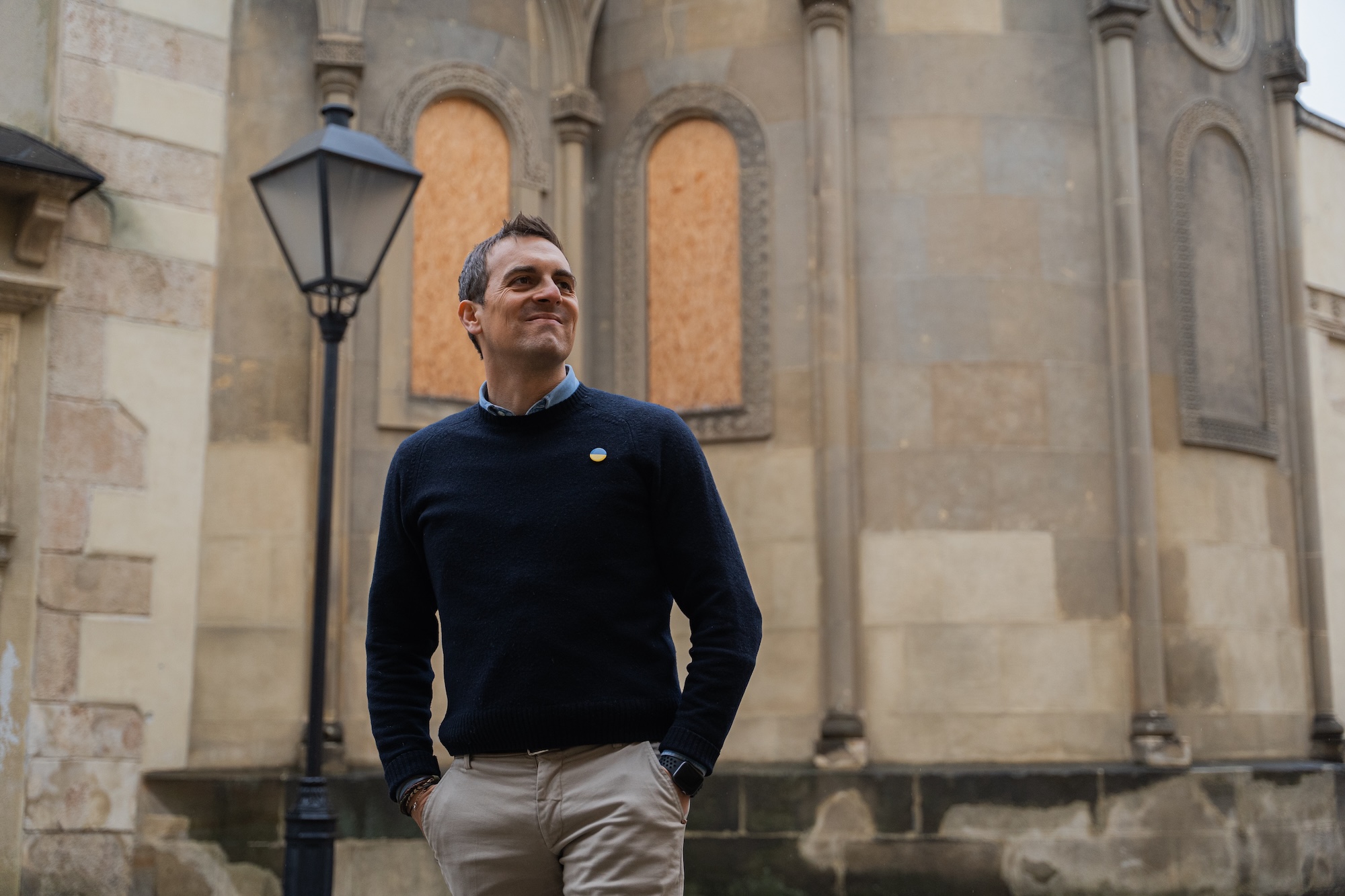
We need to explore what we can develop. There is no final decision yet, and maybe it is a little early to talk about it, but we are thinking about inviting Ukrainian veterans to Cortina for rehabilitation. That would be great.
It is important to introduce the Italian people to those who worked in the public sector, in art and literature, and at a moment’s notice became soldiers.
Italians, like citizens of other Western countries, tend to believe that there is a career in the military and a career in literature and art, as if those two worlds are wholly separate. Nowadays, the reality is different.
We are talking about this with the Cultural Strategy Institute in Lviv. Why not try to build a partnership in this way?
